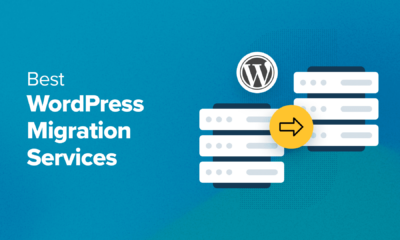TECHNOLOGY
6 Top Cloud Consulting Services to Consider in 2022
Since the pandemic, the digital shift accelerated due to remote work, and cloud computing has transformed into the de facto decision of IT.
It has already reshaped the way companies do business. However, cloud consulting service providers have also created value in this niche. The top service providers have been continuously involved in rapid adoption and growth to modernize operations and expand IT capabilities.
If you are looking for the top best cloud computing services in 2022, this is the right place for you to find out. We’ve compiled a list of top cloud service providers in 2022.
Let’s explore them one by one.
Things to Consider while Choosing the Best Service for your Business

Cloud computing services help businesses save money, boost security and establish high-quality services. If you want to adopt cloud consulting services, you can consider a few essential things while choosing the best one for you.
-
It’s important to consider what you need and what kind of problems you are trying to solve with the cloud computing services.
-
It’s best to keep in mind what your business model is and what features are essential and practical for your business.
Even though most cloud computing services offer similar services, you can check out the following key features and choose which one works best for your company.
Top 6 Cloud Service Providers in 2022

1. Amazon Web Services (AWS) Cloud
One of the most popular cloud computing services is AWS Cloud. Amazon Web Services is a cloud service provider, which can be used independently. In addition, AWS can be used collectively for a broader experience. With a blend of AWS and Elastic Compute Cloud, users can create interactive solutions for their websites.
Since AWS shares the highest portion of the top cloud providers’ market share, it has come out as the number one global vendor for cloud services. It offers around 200+ IaaS, PaaS, and SaaS cloud services, including public and hybrid contributions. AWS Cloud also includes high-performance computing, containers, the IoT, edge computing, eCommerce, machine learning, VR/AR, and serverless computing. AWS has a presence in approximately 240 nations with over 80 accessibility zones.
Features
Pros
-
It has several use cases, including cloud migration, cloud operations, content delivery, database migrations, analytics, edge computing, and front-end & mobile development.
-
Users can also use AWS’s Elastic Compute Cloud if the organization is an enterprise, startup, or public sector.
-
When it comes to setup, Elastic Compute Cloud is easy for beginners.
Cons
Pricing:
It encompasses different pricing solutions such as pay-as-you-go, pays less by using more, etc.
2. Microsoft Azure
A cloud computing platform and online portal, Microsoft Azure allows its users to access and manage cloud services and resources provided by Microsoft. It offers virtual machines and storage documents that are durable and highly available. It has scalable cloud storage and functional cloud servers. Microsoft Azure has many comprehensive services, which can be used for different needs.
Features
-
Flexible
-
Scalable
-
Unique storage system
-
Enhanced existing IT system
-
Strong support in Analytics
-
IaaS (Infrastructure as a Service)
Pros
-
It has a SQL database, which offers managed and SQL in the cloud application.
-
It automates many repetitive tasks which means that the users can focus more on innovation rather than trying to maintain infrastructure.
-
Due to its hybrid cloud services, it is easier to create cloud-based apps for web and mobile.
-
Azure also allows integration of any framework, language, and tool.
Cons
-
The virtual machine console access has some disadvantages and deficiencies.
-
The ease of access is also a problem for some businesses.
-
It would be better if there were more room for OS support.
-
Speed is slow and can be an issue for some businesses.
-
It has complicated pricing.
Pricing
The pricing details differ depending on different scenarios. The cloud users can contact the sales and calculate pricing for their cloud offerings and cloud environment.
3. Google Cloud
Google Cloud enables users to unify data across your business with storage space. Put simply, it works in a straightforward and open way to help cloud users to bring their data together. Thanks to its smart analytics and database solutions, Google Cloud Platform is one of the most convenient cloud computing providers.
Features
-
Hosting: The Google Cloud platform offers two hosting options: the App Engine, their Platform-as-a-Service, and Computes Engine as an IaaS (Infrastructure-as-a-Service).
Pros
-
It is a user-friendly cloud-based service with a straightforward interface.
-
Its service offerings include smart analytics to have better insights into user’s data at any scale. Its AI also simplifies analytics for cloud users.
-
Google Cloud is considered as a security-oriented cloud computing service. It gives the highest level of security since the importance of security level issues is essential.
Con
-
Google Cloud’s dependence on a third-party may not be ideal for some cloud users.
-
The tutorials and help documentation of Google Cloud Platform need to be improved and updated.
-
It’s pricing is comparatively higher.
Pricing
The pricing of Google Cloud may differ depending on the different business models. For more information, users can contact the sales for detailed pricing information.
4. IBM Cloud
One of the most used cloud providers, IBM Cloud, mainly focuses on IaaS, SaaS, and PaaS services. It is among the innovators in the cloud space and offers public, multi-cloud, and hybrid clouds, which are intended to handle a variety of functions, such as storage, networking, AI/ML, blockchain, automation, containers, security, and even Quantum computing. IBM Cloud has 60 data centers operating worldwide.
Features
Pros
-
An open and managed cloud service provider, IBM Cloud provides cloud management and cloud migration.
-
IBM cloud can easily integrate with many other platforms, making cloud computing functional.
-
The data migration solutions can enhance your data integrity. Users can also increase the ROI of their businesses.
Cons
Pricing
The pricing plans may differ according to different cloud services. Users can also check the IBM cloud cost estimator to calculate the pricing of a wide range of cloud technologies.
5. Oracle Cloud
A hybrid cloud service, Oracle Cloud is generally used by development teams and IT administrators. It offers a wide range of integrated public cloud services and apps, including IaaS, PaaS, and SaaS on-premises cloud capabilities. It mainly focuses on services designed specifically for tasks such as SCM, EPM, ERP, marketing, and sales. It also supports Kubernetes, AI/ML, IoT, and other digital technologies.
Features
-
Security Assessment
-
User Assessment
-
Data Discovery
-
Data Masking
-
Activity Auditing
Pros
-
It has a cloud backup and disaster recovery that makes the user’s cloud safe and easy to manage if errors occur.
-
Easy migration of data for cloud users.
-
Its FastConnect feature allows its users to build multi-cloud environments.
Cons
Pricing
To know more about the plans, it would be helpful to contact the sales team to learn more about the service pricing that fits business needs.
6. Alibaba Cloud
Alibaba Cloud is a cloud computing service which can be used independently. It is the best option if users prefer cloud computing services because it provides better security to web apps. The company has been leading in cloud computing and AI since 2009, and offers services to thousands of enterprises, government organizations, and developers in more than 200 countries and regions.
Moreover, it also offers hybrid cloud services as a cloud business. Being one of the most used cloud computing companies, Alibaba has diverse solutions that can fit users’ business needs.
Features
Pros
-
It helps users build an auto-scaling system and adjust compute capacity related to traffic functions.
-
It is easy to migrate data from an on-premises store to Alibaba Cloud. Cloud users can migrate their eCommerce websites to public cloud providers.
-
Its underlying infrastructure includes global virtual desktop infrastructure.
Cons
-
New into the US cloud market.
-
Some of the website tools such as online documentation and pricing calculator are not as advanced as some other cloud providers.
-
There is also a potential compliance issue, since Alibaba is not an American company. Therefore, there is a risk of sensitive data leakage on servers entirely outside of the U.S. Or, the chances of completely losing the data are also high.
Pricing
The developer plan starts from $19. The business plan starts from $100, and the enterprise plan starts from $8,000. A free trial is also available.
You have just gone through some critical cloud service providers in 2022. If a platform suits your organizational needs, you can reach out to them as per your needs. If you want to share your thoughts with us, comment below.
Source link
TECHNOLOGY
Next-gen chips, Amazon Q, and speedy S3

AWS re:Invent, which has been taking place from November 27 and runs to December 1, has had its usual plethora of announcements: a total of 21 at time of print.
Perhaps not surprisingly, given the huge potential impact of generative AI – ChatGPT officially turns one year old today – a lot of focus has been on the AI side for AWS’ announcements, including a major partnership inked with NVIDIA across infrastructure, software, and services.
Yet there has been plenty more announced at the Las Vegas jamboree besides. Here, CloudTech rounds up the best of the rest:
Next-generation chips
This was the other major AI-focused announcement at re:Invent: the launch of two new chips, AWS Graviton4 and AWS Trainium2, for training and running AI and machine learning (ML) models, among other customer workloads. Graviton4 shapes up against its predecessor with 30% better compute performance, 50% more cores and 75% more memory bandwidth, while Trainium2 delivers up to four times faster training than before and will be able to be deployed in EC2 UltraClusters of up to 100,000 chips.
The EC2 UltraClusters are designed to ‘deliver the highest performance, most energy efficient AI model training infrastructure in the cloud’, as AWS puts it. With it, customers will be able to train large language models in ‘a fraction of the time’, as well as double energy efficiency.
As ever, AWS offers customers who are already utilising these tools. Databricks, Epic and SAP are among the companies cited as using the new AWS-designed chips.
Zero-ETL integrations
AWS announced new Amazon Aurora PostgreSQL, Amazon DynamoDB, and Amazon Relational Database Services (Amazon RDS) for MySQL integrations with Amazon Redshift, AWS’ cloud data warehouse. The zero-ETL integrations – eliminating the need to build ETL (extract, transform, load) data pipelines – make it easier to connect and analyse transactional data across various relational and non-relational databases in Amazon Redshift.
A simple example of how zero-ETL functions can be seen is in a hypothetical company which stores transactional data – time of transaction, items bought, where the transaction occurred – in a relational database, but use another analytics tool to analyse data in a non-relational database. To connect it all up, companies would previously have to construct ETL data pipelines which are a time and money sink.
The latest integrations “build on AWS’s zero-ETL foundation… so customers can quickly and easily connect all of their data, no matter where it lives,” the company said.
Amazon S3 Express One Zone
AWS announced the general availability of Amazon S3 Express One Zone, a new storage class purpose-built for customers’ most frequently-accessed data. Data access speed is up to 10 times faster and request costs up to 50% lower than standard S3. Companies can also opt to collocate their Amazon S3 Express One Zone data in the same availability zone as their compute resources.
Companies and partners who are using Amazon S3 Express One Zone include ChaosSearch, Cloudera, and Pinterest.
Amazon Q
A new product, and an interesting pivot, again with generative AI at its core. Amazon Q was announced as a ‘new type of generative AI-powered assistant’ which can be tailored to a customer’s business. “Customers can get fast, relevant answers to pressing questions, generate content, and take actions – all informed by a customer’s information repositories, code, and enterprise systems,” AWS added. The service also can assist companies building on AWS, as well as companies using AWS applications for business intelligence, contact centres, and supply chain management.
Customers cited as early adopters include Accenture, BMW and Wunderkind.
Want to learn more about cybersecurity and the cloud from industry leaders? Check out Cyber Security & Cloud Expo taking place in Amsterdam, California, and London. Explore other upcoming enterprise technology events and webinars powered by TechForge here.
TECHNOLOGY
HCLTech and Cisco create collaborative hybrid workplaces

Digital comms specialist Cisco and global tech firm HCLTech have teamed up to launch Meeting-Rooms-as-a-Service (MRaaS).
Available on a subscription model, this solution modernises legacy meeting rooms and enables users to join meetings from any meeting solution provider using Webex devices.
The MRaaS solution helps enterprises simplify the design, implementation and maintenance of integrated meeting rooms, enabling seamless collaboration for their globally distributed hybrid workforces.
Rakshit Ghura, senior VP and Global head of digital workplace services, HCLTech, said: “MRaaS combines our consulting and managed services expertise with Cisco’s proficiency in Webex devices to change the way employees conceptualise, organise and interact in a collaborative environment for a modern hybrid work model.
“The common vision of our partnership is to elevate the collaboration experience at work and drive productivity through modern meeting rooms.”
Alexandra Zagury, VP of partner managed and as-a-Service Sales at Cisco, said: “Our partnership with HCLTech helps our clients transform their offices through cost-effective managed services that support the ongoing evolution of workspaces.
“As we reimagine the modern office, we are making it easier to support collaboration and productivity among workers, whether they are in the office or elsewhere.”
Cisco’s Webex collaboration devices harness the power of artificial intelligence to offer intuitive, seamless collaboration experiences, enabling meeting rooms with smart features such as meeting zones, intelligent people framing, optimised attendee audio and background noise removal, among others.
Want to learn more about cybersecurity and the cloud from industry leaders? Check out Cyber Security & Cloud Expo taking place in Amsterdam, California, and London. Explore other upcoming enterprise technology events and webinars powered by TechForge here.
TECHNOLOGY
Canonical releases low-touch private cloud MicroCloud

Canonical has announced the general availability of MicroCloud, a low-touch, open source cloud solution. MicroCloud is part of Canonical’s growing cloud infrastructure portfolio.
It is purpose-built for scalable clusters and edge deployments for all types of enterprises. It is designed with simplicity, security and automation in mind, minimising the time and effort to both deploy and maintain it. Conveniently, enterprise support for MicroCloud is offered as part of Canonical’s Ubuntu Pro subscription, with several support tiers available, and priced per node.
MicroClouds are optimised for repeatable and reliable remote deployments. A single command initiates the orchestration and clustering of various components with minimal involvement by the user, resulting in a fully functional cloud within minutes. This simplified deployment process significantly reduces the barrier to entry, putting a production-grade cloud at everyone’s fingertips.
Juan Manuel Ventura, head of architectures & technologies at Spindox, said: “Cloud computing is not only about technology, it’s the beating heart of any modern industrial transformation, driving agility and innovation. Our mission is to provide our customers with the most effective ways to innovate and bring value; having a complexity-free cloud infrastructure is one important piece of that puzzle. With MicroCloud, the focus shifts away from struggling with cloud operations to solving real business challenges” says
In addition to seamless deployment, MicroCloud prioritises security and ease of maintenance. All MicroCloud components are built with strict confinement for increased security, with over-the-air transactional updates that preserve data and roll back on errors automatically. Upgrades to newer versions are handled automatically and without downtime, with the mechanisms to hold or schedule them as needed.
With this approach, MicroCloud caters to both on-premise clouds but also edge deployments at remote locations, allowing organisations to use the same infrastructure primitives and services wherever they are needed. It is suitable for business-in-branch office locations or industrial use inside a factory, as well as distributed locations where the focus is on replicability and unattended operations.
Cedric Gegout, VP of product at Canonical, said: “As data becomes more distributed, the infrastructure has to follow. Cloud computing is now distributed, spanning across data centres, far and near edge computing appliances. MicroCloud is our answer to that.
“By packaging known infrastructure primitives in a portable and unattended way, we are delivering a simpler, more prescriptive cloud experience that makes zero-ops a reality for many Industries.“
MicroCloud’s lightweight architecture makes it usable on both commodity and high-end hardware, with several ways to further reduce its footprint depending on your workload needs. In addition to the standard Ubuntu Server or Desktop, MicroClouds can be run on Ubuntu Core – a lightweight OS optimised for the edge. With Ubuntu Core, MicroClouds are a perfect solution for far-edge locations with limited computing capabilities. Users can choose to run their workloads using Kubernetes or via system containers. System containers based on LXD behave similarly to traditional VMs but consume fewer resources while providing bare-metal performance.
Coupled with Canonical’s Ubuntu Pro + Support subscription, MicroCloud users can benefit from an enterprise-grade open source cloud solution that is fully supported and with better economics. An Ubuntu Pro subscription offers security maintenance for the broadest collection of open-source software available from a single vendor today. It covers over 30k packages with a consistent security maintenance commitment, and additional features such as kernel livepatch, systems management at scale, certified compliance and hardening profiles enabling easy adoption for enterprises. With per-node pricing and no hidden fees, customers can rest assured that their environment is secure and supported without the expensive price tag typically associated with cloud solutions.
Want to learn more about cybersecurity and the cloud from industry leaders? Check out Cyber Security & Cloud Expo taking place in Amsterdam, California, and London. Explore other upcoming enterprise technology events and webinars powered by TechForge here.
-

 MARKETING7 days ago
MARKETING7 days agoRoundel Media Studio: What to Expect From Target’s New Self-Service Platform
-

 SEO6 days ago
SEO6 days agoGoogle Limits News Links In California Over Proposed ‘Link Tax’ Law
-
SEARCHENGINES7 days ago
Daily Search Forum Recap: April 12, 2024
-

 SEARCHENGINES5 days ago
SEARCHENGINES5 days agoGoogle Core Update Volatility, Helpful Content Update Gone, Dangerous Google Search Results & Google Ads Confusion
-

 SEO5 days ago
SEO5 days ago10 Paid Search & PPC Planning Best Practices
-

 MARKETING6 days ago
MARKETING6 days ago2 Ways to Take Back the Power in Your Business: Part 2
-

 MARKETING4 days ago
MARKETING4 days ago5 Psychological Tactics to Write Better Emails
-

 PPC6 days ago
PPC6 days agoCritical Display Error in Brand Safety Metrics On Twitter/X Corrected















You must be logged in to post a comment Login